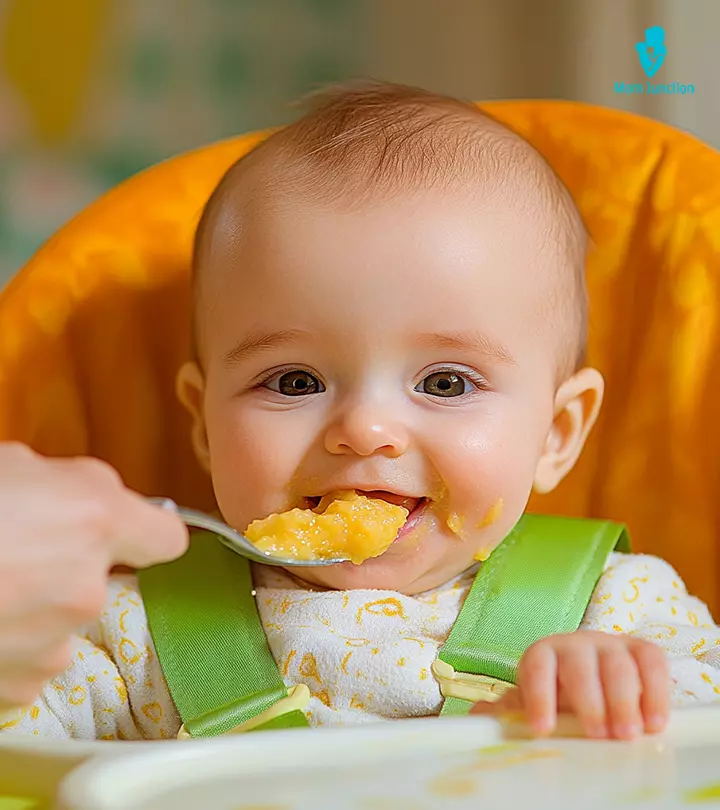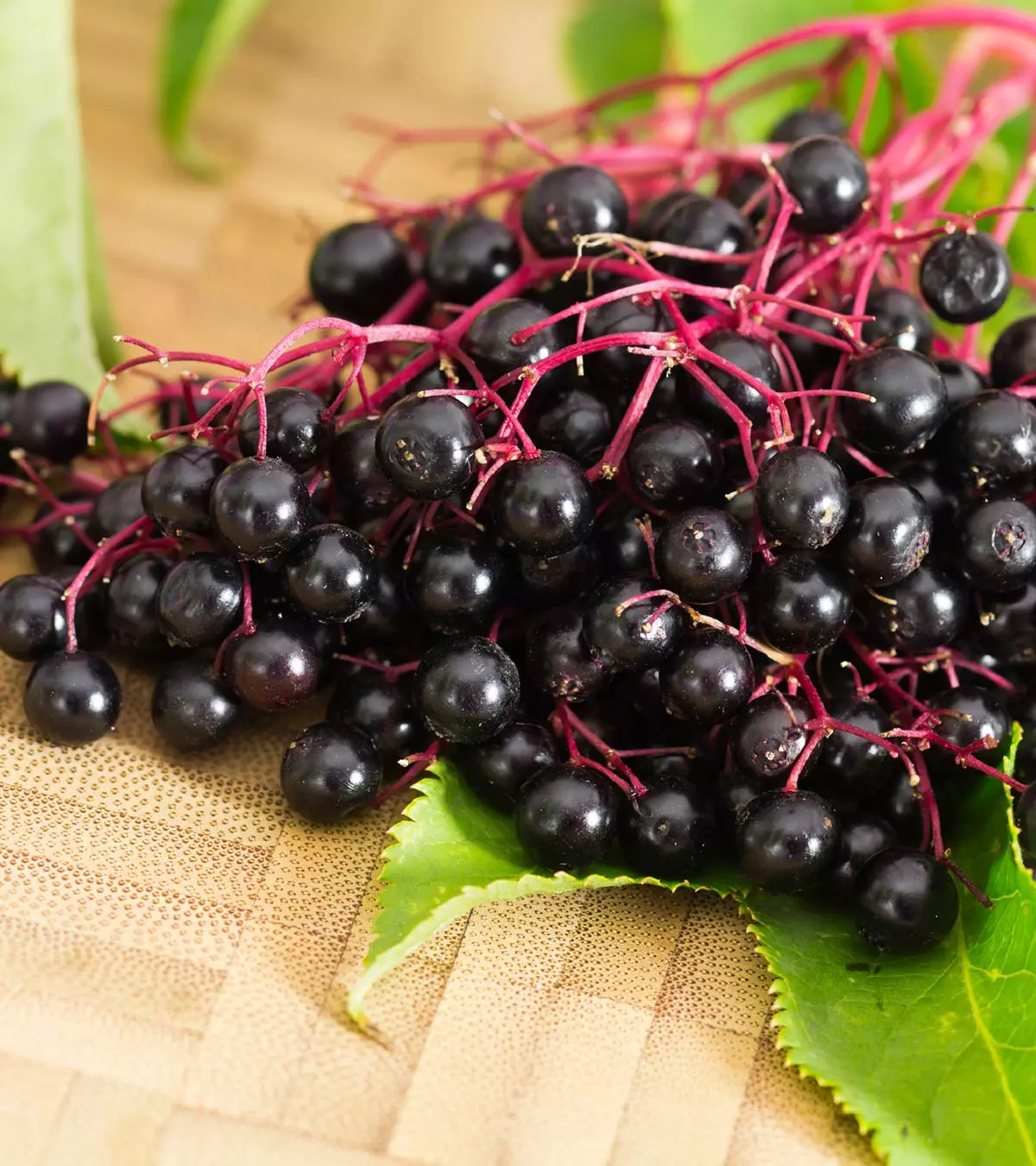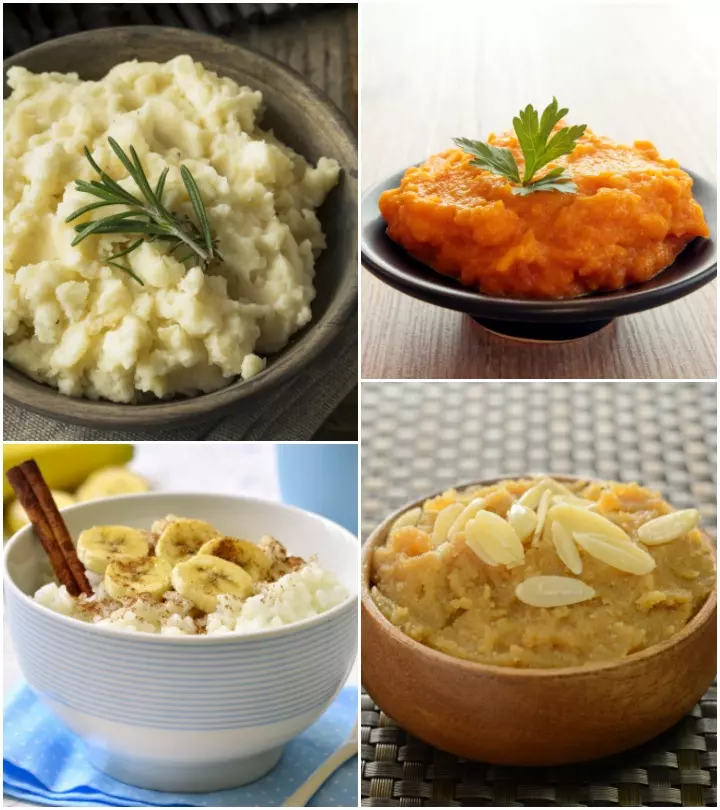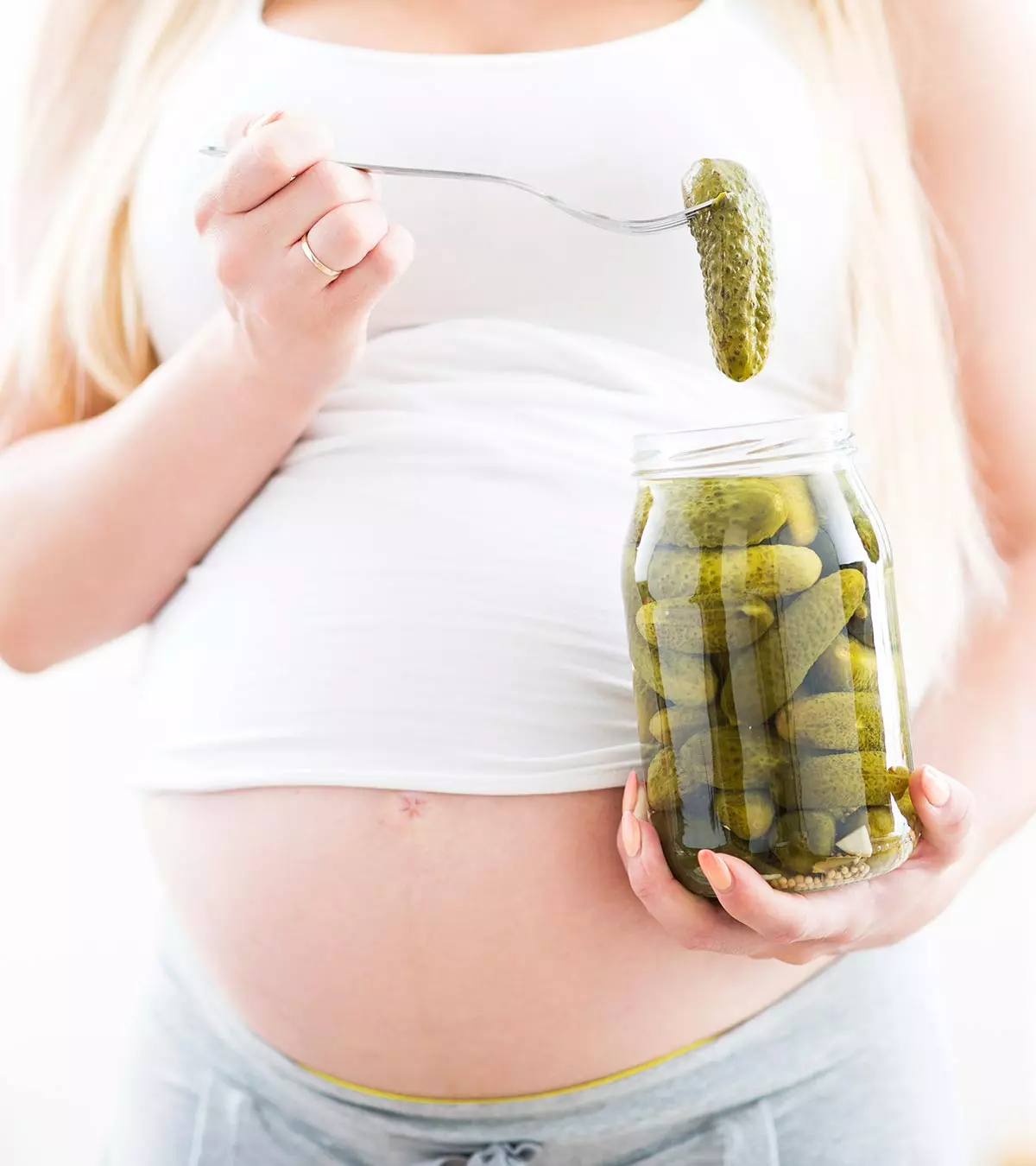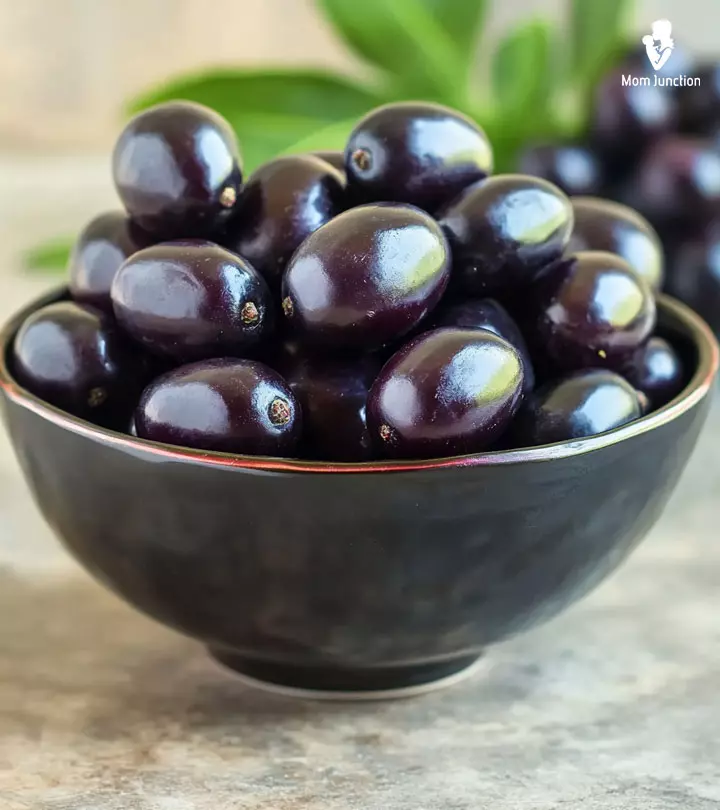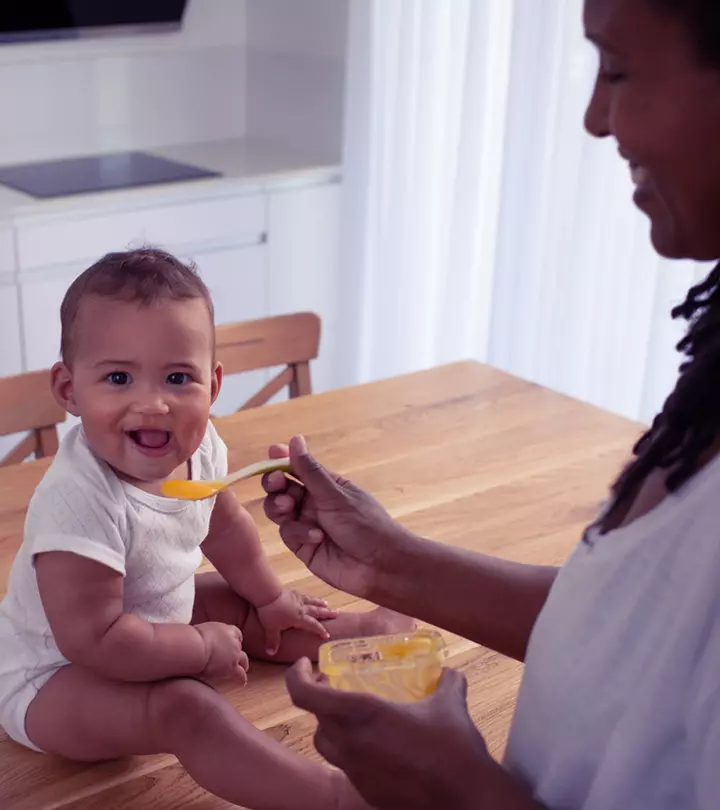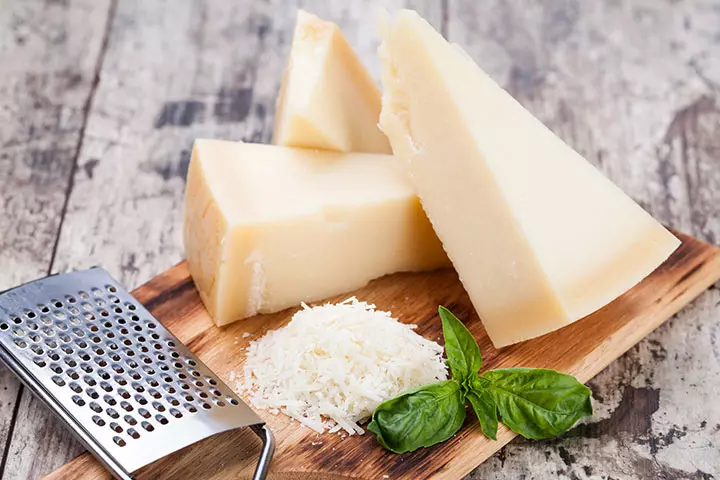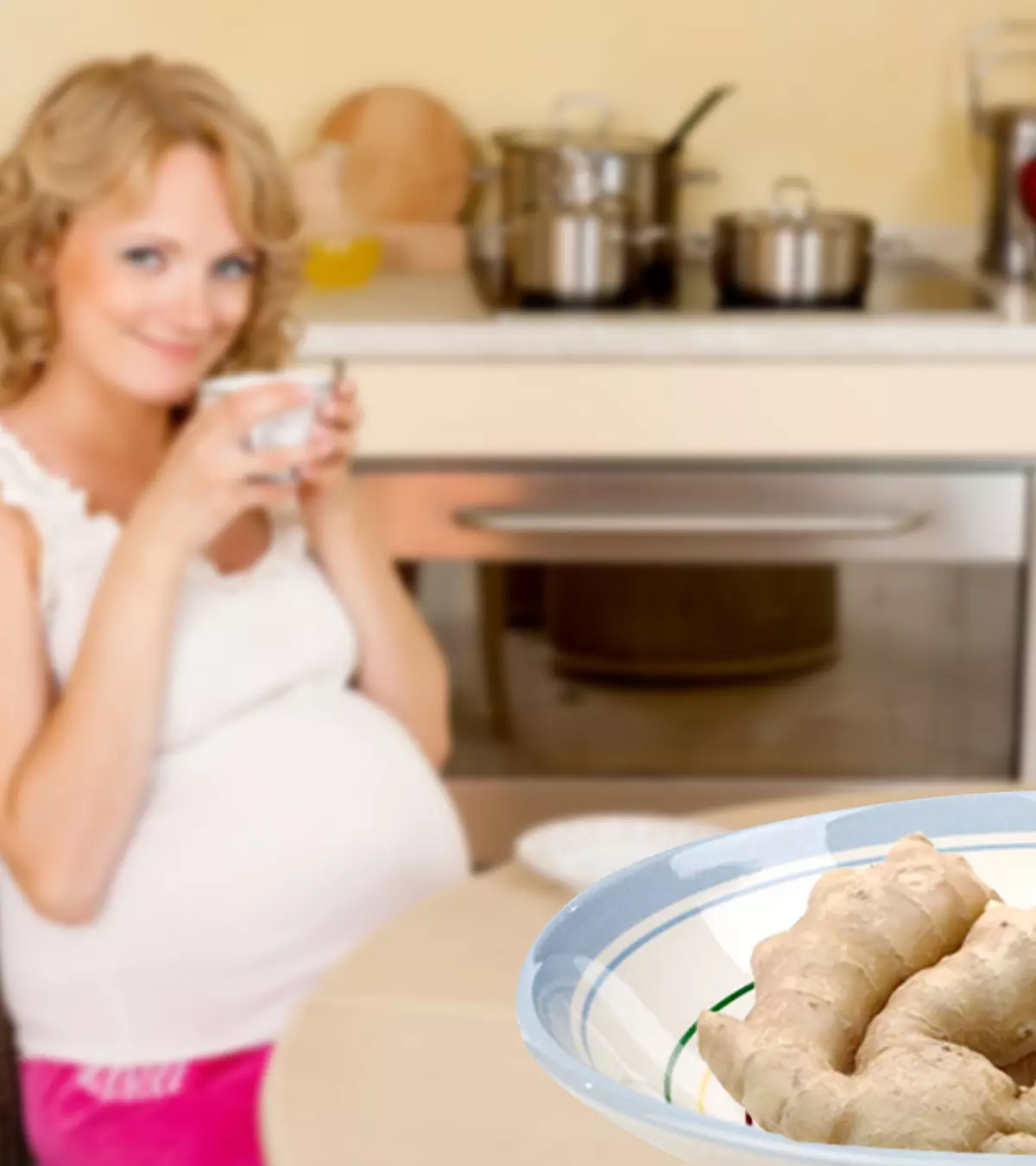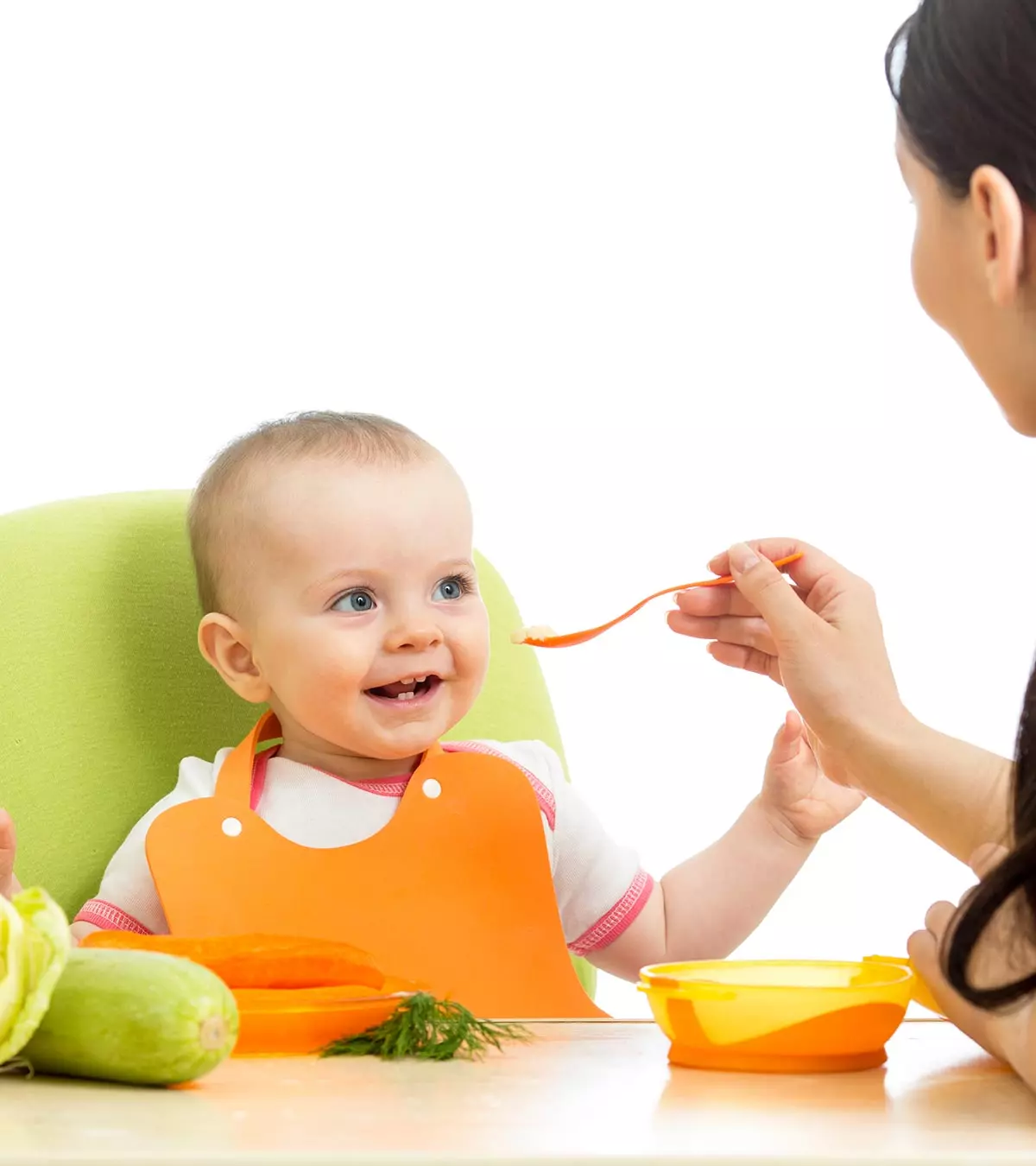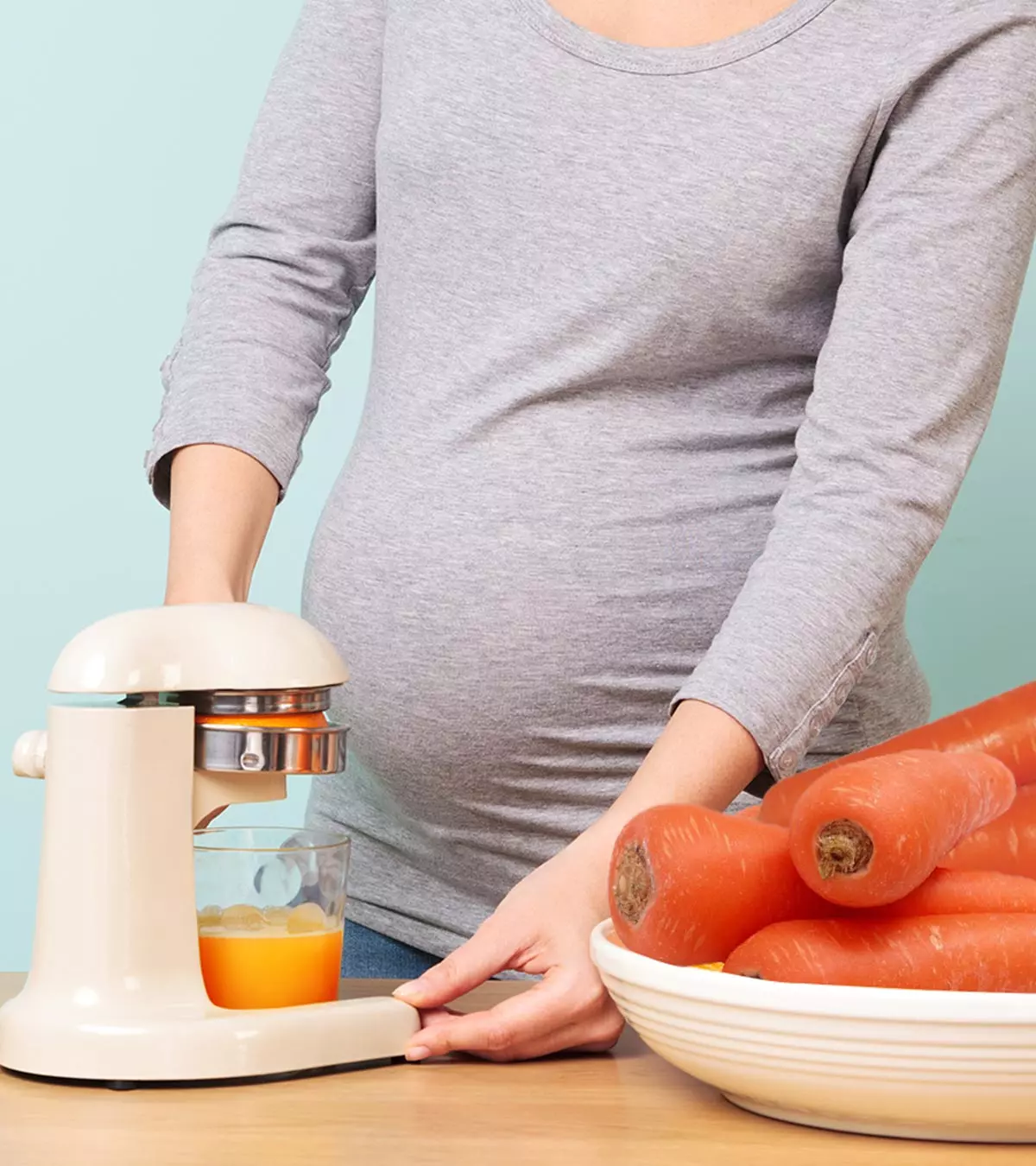
Image: ShutterStock
Carrots are a rich source of beta-carotene (antioxidantiCompounds that prevent or delay cellular damage caused by free radicals ), vitamins, and calcium (1). In addition, consuming carrot juice during pregnancy can protect you and your baby from various illnesses by boosting your immunity (2).

During pregnancy, you may not be able to enjoy some beverages that you used to. So carrots can provide you with energy and freshness while quenching your thirst. In addition, this nutrient-rich vegetable provides essential prenatal nutrition that can help you through the journey of a healthy pregnancy and aid in the overall development of the fetus (3).
This post tells you everything you need to know about carrots and their benefits for pregnant women, including their side effects.
Key Pointers
- Drinking carrot juice while pregnant improves immunity and promotes healthy fetal growth.
- The consumption of carrots lowers blood sugar and guards against liver disorders.
- Carrots are high in vitamins A and C and fiber, which is beneficial for pregnant women.
- Vitamin A in carrots aids in the prevention of infections and enhances the quality of breast milk.
- To ensure safety, consult a doctor about the quantity of carrots or carrot juice you should consume daily while pregnant.
Benefits Of Carrot Juice During Pregnancy
Carrot, a non-starchy vegetable, contains several essential nutrients and bioactive compounds that can help promote overall health. Hence, expecting women should consume carrots in different forms, including juice. Unstrained carrot juice is one of the healthy juices to drink during pregnancy that can provide you with fiber and several essential micronutrients.
Here are the health benefits of moderate consumption of carrot juice as part of a well-balanced diet:
- Carrots contain high levels of antioxidants, particularly beta-carotene, a precursor to vitamin A, that converts into retinoic acid which may help cleanse the liver and support overall liver health (5).
- They contain various vitamins, minerals, and phytochemicals that can help strengthen your immunity and fight free radical damage (2).


The following chart illustrates a comparative analysis of the antioxidant capacity of carrot and beetroot juice. According to the graph, 100 ml of fresh beetroot juice contains higher levels of ascorbic acid and total phenols than carrot juice, which may explain its superior total antioxidant activity. However, carrot juice contains abundant carotenoids, which are scarce in beetroot juice.

Graph1:Vital bioactive compounds in carrot and beetroot juice
Source: Physicochemical and Bioactive Compounds in Carrot and Beetroot Juice; Journal of Dairying, Foods & Home SciencesGraph2:Vital bioactive compounds in carrot and beetroot juice
Source: Physicochemical and Bioactive Compounds in Carrot and Beetroot Juice; Journal of Dairying, Foods & Home SciencesGraph 3:Vital bioactive compounds in carrot and beetroot juice
Source: Physicochemical and Bioactive Compounds in Carrot and Beetroot Juice; Journal of Dairying, Foods & Home SciencesGraph 4:Vital bioactive compounds in carrot and beetroot juice
Source: Physicochemical and Bioactive Compounds in Carrot and Beetroot Juice; Journal of Dairying, Foods & Home SciencesInteresting Consumption Tips
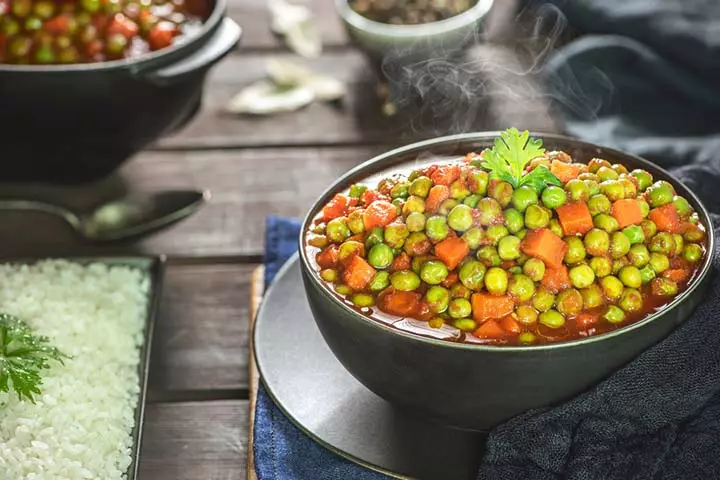
Carrots are delicious. Keeping in mind some simple tips will ensure all vital nutrients are retained. Here is what you should know:
- Carrots that are less than 6 inches are sweet. Look for the shorter variants if you prefer the sweet taste; otherwise, opt for the longer ones.
- The vital nutrients remain concentrated under the skin, so try to take it with the skin. You can use a hard brush to clean it properly.
- Carrots are mild root vegetables that can easily be mixed with other ingredients.
 Quick tip
Quick tipEasy Carrot Recipes For Pregnant Women
Looking to add more carrots to your pregnancy diet? Here are a couple of simple, healthy recipes that make use of this nutritious ingredient.
1. Carrot juice smoothie
You will need:
- Carrot juice
- Oat milk
- Bananas
- Frozen mango
- Pineapple
- Ginger
How to:
- Pour the carrot juice and milk into a large, high-powered blender.
- Next, add your frozen fruits and a small piece of ginger.
- Blend on high speed until the fruits and ginger are fully mixed and smooth.
- Pour the smoothie into glasses and enjoy right away for a refreshing, nutrient-packed drink. You may add a few ice cubes if you want it extra chilled.
2. Carrot salad
You will need:
- Sesame seeds
- Agave syrup
- Parsley
- Seasonings
- Lime juice
- Carrot
- Apple cider vinegar
How to:
- Thinly slice the carrots and set them aside in a bowl.
- In a large bowl, mix the oil, lime juice, apple cider vinegar, agave syrup, seasonings, and salt. Stir until all the ingredients are blended well.
- Add the sliced carrots, chopped parsley, and sesame seeds to the bowl with the dressing. Toss everything together until the carrots are well coated.
- You may serve the salad right away, or let it sit for a few minutes to allow the carrots to soften a bit.
Tips For Storing And Preparing Carrots For Nutrient Retention
Carrots are seasonal; however, with proper preparation and storage, you can reap their nutritional benefits all year long. Try these carrot storing and preparing tips (13).
- Remove the green tops of carrots to keep them fresh for several days.
- Choose undamaged and unpeeled carrots and keep them in the refrigerator at 0-4 degrees Celsius.
- Slice carrots into small pieces, soak them in water, and store them in the refrigerator for a few days (14).
- Keep unwashed carrots in a sealed container in the vegetable drawer of your refrigerator with some moisture for a few weeks.
- For large quantities of freshly harvested carrots, place them in a bucket of damp sand and store them in a cool, dry place for three to four months.
- For longer storage, make fresh carrot juice and pour it into sterilized bottles, followed by pasteurization for a few minutes.
You can also ferment carrots to store them for several months.
Risks Of Carrots Or Carrot Juices In Pregnancy
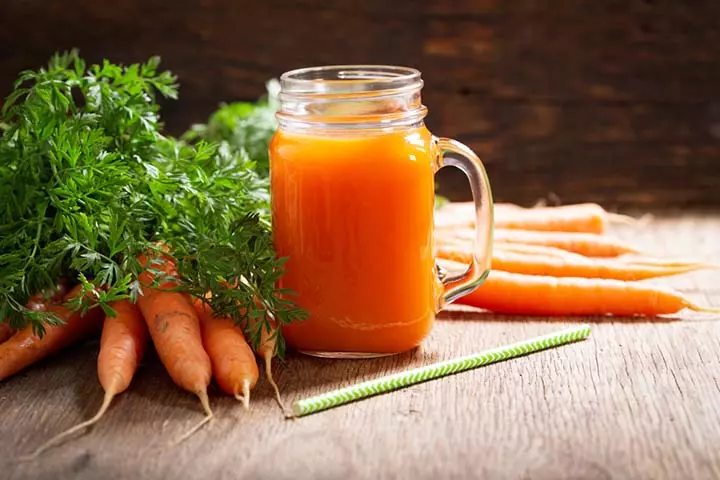
While carrots in raw form or juice are nutritious no doubt, excessive consumption can lead to certain complications in pregnancy as well. Here is why you should be careful:
- Carrots contain carotene, which is a provitamin A that gets converted in your body only when the need arises (15).
- It is not possible for you to get high amounts of vitamin A by taking carotene, as your body regulates the conversion of carotene to vitamin A.
- Too much indigestion of carotene leads to carotenemia, which eventually turns the skin yellow (16).
- B-carotene is also known to cause cancer.
Consult your doctor about the amount of daily consumption of carrot or carrot juice during pregnancy. They will help you decide if carrots are safe for your pregnancy. Put to rest all your worries and enjoy a healthy diet.
Frequently Asked Questions
1. Can I eat raw carrots while pregnant?
Yes, raw carrots are a good source of essential vitamins, minerals, and fiber. They can provide you with a fair amount of vitamin A during pregnancy and contribute to your overall nutritional needs. So eat raw carrots during pregnancy but ensure you thoroughly wash them before consuming them (17).
2. How many carrots are safe to eat while pregnant?
You may have one cup of raw or cooked carrots daily during pregnancy and keep alternating between different recommended vegetables of the same portion size three times a day (18).
3. Can eating carrots during pregnancy help improve my baby’s eyesight?
There is no evidence that carrots improve eyesight. However, they may help maintain a healthy vision (19).
4. How can consuming carrots help with constipation during pregnancy?
Carrots contain high amounts of dietary fiber that add bulk to the stool and promote healthy bowel movements. In addition, they contain water that can help keep the stools soft, which is essential to prevent and/or manage constipation (20). You can consume carrots with other healthy foods such as orange or cucumber to amplify its functional properties. Eating cucumber during pregnancy can also help with constipation.
Drinking carrot juice during pregnancy may be a good practice because these vegetables are loaded with nutrients such as vitamins and beta-carotene. These nutrients help boost your immunity, cleanse your liver, aid better fetal development, and in several other ways. Since carrots have a mild taste, you can also mix them with other ingredients to create different recipes or add them to your green smoothies for a hint of color. However, ensure not to consume carrot juice in excess as it may lead to carotene indigestion that can turn your skin yellow. So, if you plan to introduce carrot juice during pregnancy, consult your doctor for the right amount suitable for consumption.
Infographic: Benefits Of Carrot Juice During Pregnancy
Carrot is one of the many nutritious vegetables that can support your health and facilitate the baby’s growth and development. While you can consume carrots raw or cooked, their juice is also known to confer several health benefits. Read the infographic below to learn how carrot juice can benefit moms-to-be and their unborn babies.
Some thing wrong with infographic shortcode. please verify shortcode syntaxIllustration: Amazing Benefits Of Carrot And Its Juices During Pregnancy
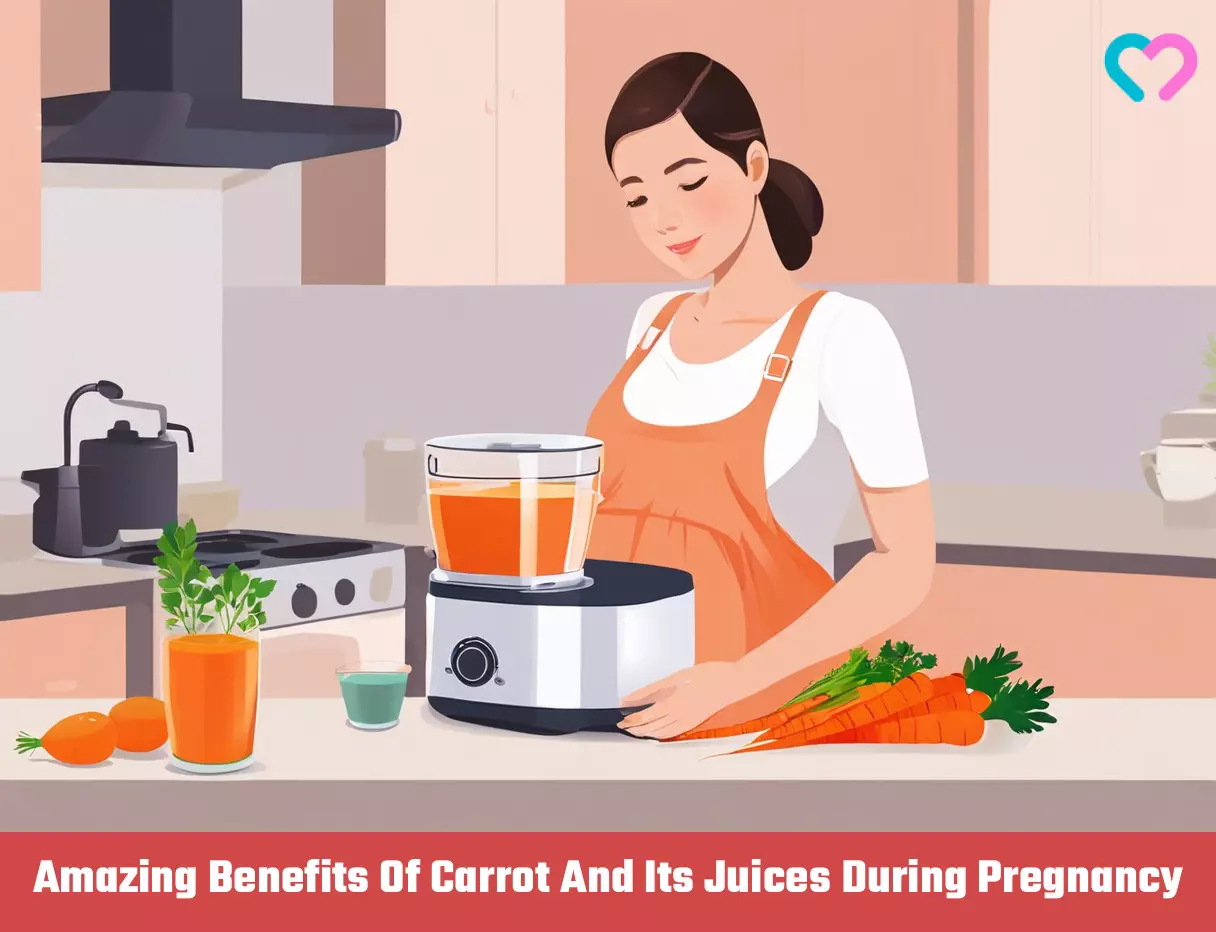
Image: Stable Diffusion/MomJunction Design Team
References
- Carrots raw
https://fdc.nal.usda.gov/fdc-app.html#/food-details/170393/nutrients - Foods To Boost The Immune System
https://www.pcrm.org/news/blog/foods-boost-immune-system - Nutrition During Pregnancy
https://www.hopkinsmedicine.org/health/wellness-and-prevention/nutrition-during-pregnancy - Could Carrots Help Prevent Type 2 Diabetes?
https://www.diabetes.org.uk/our-research - Laszlo Nagy; (2012); Would eating carrots protect your liver? A new role involving NKT cells for retinoic acid in hepatitis; Johns Hopkins University
- Lambert, Victoria, et al.; (2025); Maternal Dietary Components in the Development of Gestational Diabetes Mellitus: A Systematic Review of Observational Studies to Timely Promotion of Health.
https://nutritionj.biomedcentral.com/articles/10.1186/s12937-023-00846-9 - Facts for Feeding
http://rehydrate.org/cgi-sys/suspendedpage.cgi - Avoid Anemia: Tips to Get More Iron in Pregnancy
https://unmhealth.org/stories/2025/04/avoid-anemia-tips-get-more-iron-pregnancy.html - Zielińska, Monika A., et al.; (2017); Health Effects of Carotenoids During Pregnancy and Lactation
https://www.ncbi.nlm.nih.gov/pmc/articles/PMC5579631/ - Antioxidants: Protecting Healthy Cells
https://www.eatright.org/health/essential-nutrients/vitamins/antioxidants-protecting-healthy-cells - Pregnant or Breastfeeding? Nutrients You Need
https://kidshealth.org/en/parents/moms-nutrients.html - 10 foods and drinks with surprising oral health benefits
https://www.dentalhealth.org/blog/10-foods-and-drinks-with-surprising-oral-health-benefits - A-Z Food Storage Tips.
https://www.greshamoregon.gov/error/404 - Healthy Eating Tips.
https://www.cdc.gov/nccdphp/dnpao/features/healthy-eating-tips/index.html - The Nutrition Source
https://nutritionsource.hsph.harvard.edu/vitamin-a/ - Can Eating Too Many Carrots Turn Your Skin Orange?
https://health.clevelandclinic.org/can-eating-too-many-carrots-turn-your-skin-orange - Nutrition During Pregnancy.
https://www.acog.org/womens-health/faqs/nutrition-during-pregnancy - Eat right for you and baby too.
https://www.mobapbaby.org/Pregnancy-Guide/Ensuring-a-Healthy-Pregnancy/Nutrition/Eat-Right - Old wive’s tales.
https://www.hopkinsmedicine.org/all-childrens-hospital/patient-families - 5 Tips to Relieve Pregnancy Constipation
https://unmhealth.org/stories/2025/06/5-tips-relieve-pregnancy-consumption.html - Nutrition for you and your baby
https://www.wm.edu/as/programs/healthy_beginnings/files/healthy_beginnings_originals/nutrition_booklet_updated
Community Experiences
Join the conversation and become a part of our nurturing community! Share your stories, experiences, and insights to connect with fellow parents.
Read full bio of Shivani Sikri
Read full bio of Rebecca Malachi
Read full bio of Swati Patwal
Read full bio of Dr. Joyani Das

 Quick fact
Quick fact




